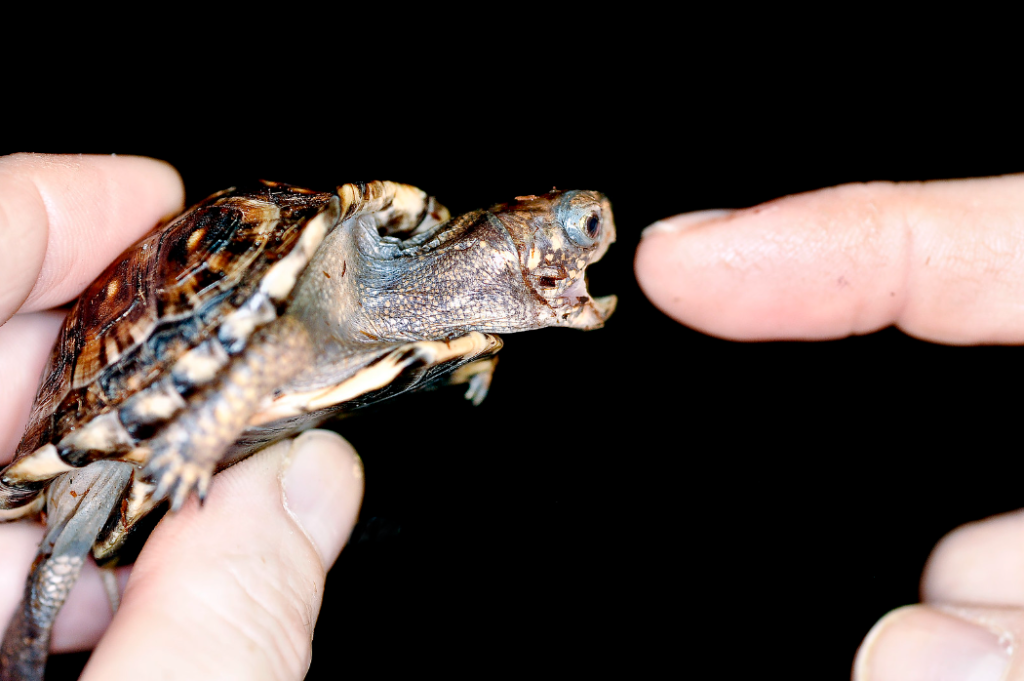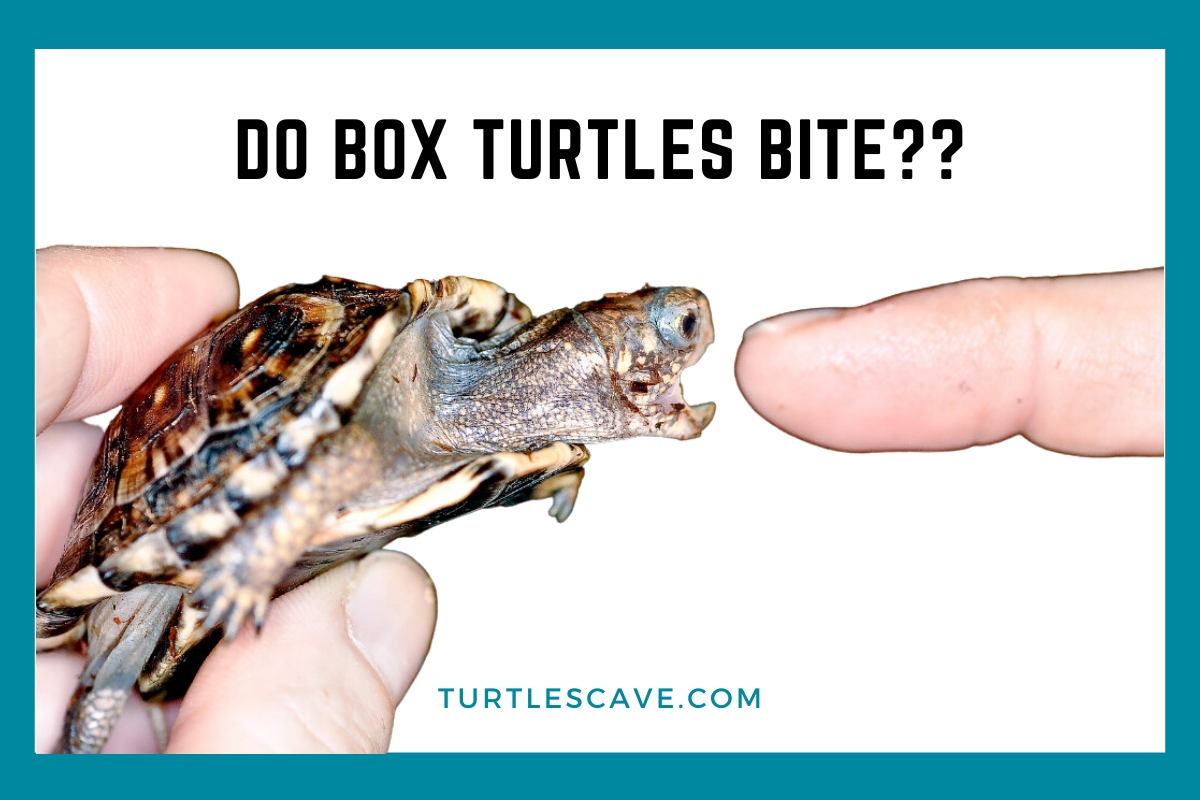Yes, box turtles can bite. Box turtles have a reputation as docile and gentle creatures.
However, when they feel threatened or provoked, they may bite as a form of self-defense. Box turtles have powerful jaws that can cause injury to their handlers. It’s important to handle them with care and respect their space to avoid getting bitten.
In addition, it’s crucial to wash your hands thoroughly after handling box turtles as they can carry salmonella bacteria. In this article, we’ll delve deeper into the world of box turtles and explore their behavior, habitat, diet, and more. Whether you’re a longtime turtle owner or considering welcoming one into your home, this guide will provide valuable insights into caring for these fascinating creatures.

Credit: Cole Sauter
Anatomy Of Box Turtles
Box turtles are fascinating animals, known for their unique features such as their domed shell and hinged plastron. However, one question that often comes up about these creatures is whether they bite or not. To start with, let’s take a closer look at the anatomy of box turtles and their physical properties in this blog post section titled “anatomy of box turtles.
“
Description Of Box Turtle’S Physical Properties
- Box turtles have a hard, dome-shaped shell that covers their body, which helps protect them from predators.
- They have four strong legs that end in sharp claws, allowing them to burrow and climb with ease.
- On their head, box turtles have two small, beady eyes, a nose, and a mouth with a beak-like structure that they use for feeding.
- Box turtles come in a variety of colors ranging from olive green to brown, and some species have distinct patterns on their shell.
Overview Of The Turtle’S Beak And Mandibles
- A box turtle’s beak is a hard, bony structure that resembles that of a bird’s beak and is located on the upper part of their mouth.
- Box turtles use their beak to crush, tear, and cut food into small pieces before swallowing it.
- Their mandibles, or jaws, are strong and muscular and are used to grip and manipulate food. The inner lining of the mouth also has sharp edges for cutting food.
Comparison Of Box Turtle’S Beak And A Dog’S Bite
- The bite of a dog has far more force than the bite of a box turtle, which is not strong enough to cause serious injury to humans or other large animals.
- A box turtle’s beak may cause a small scratch or puncture wound, but this is typically not a cause for concern as long as proper first aid is administered.
- It is important to remember that box turtles will only bite as a last resort when they feel threatened or scared, so it is always best to give them their space and let them go about their business.
Box turtles have a unique anatomy that allows them to thrive in their environment without causing harm to humans or larger animals. Understanding their physical properties, including their beak and mandibles, can help us appreciate these amazing creatures even more.
Turtles’ Biting Behaviors

Credit: Waz Griffin
Box turtles are known for their cute looks, gentle nature and their docile nature. People of all ages love to watch them roam around the garden, but many are left with the question, “do box turtles bite? ” In this section, we will explore the biting behaviors of box turtles, their personalities and the frequency of bites.
Examination Of Box Turtles’ Personalities
Box turtles are not aggressive animals and are unlikely to bite people or other animals. However, like every other living being, turtles have unique personalities, and some may be more defensive than others. Here are some essential characteristics of box turtles that may influence their biting behavior:
- Box turtles can be shy or wary of humans.
- They are solitary creatures who don’t like being crowded or handled.
- If they feel threatened or scared, they will withdraw their limbs and head inside their shell.
- They may come out of their shell to explore if they feel comfortable.
Information On Different Types Of Biting
Box turtles generally bite for two reasons: aggression and defense. Here are the types of bites box turtles are known to have:
- Warning or defensive bite: This happens when a box turtle feels threatened, scared or provoked. It is a quick nip, usually without much damage.
- Aggression bite: This occurs when males fight for territory or dominant status, and the bite can be painful and cause damage.
Discussion On The Frequency Of Bites Among Box Turtles
In general, box turtles are unlikely to bite humans unless they feel threatened or scared. However, there have been cases of turtles biting people and other animals, particularly in captivity. Here are some possible reasons for turtle bites:
- Handling: Box turtles don’t like being picked up or touched, and they may bite you if they feel trapped or uncomfortable.
- Fear: Box turtles may perceive strangers, children, dogs, and other animals as threats and try to defend themselves.
- Hunger: Hungry turtles may mistakenly bite fingers or toes if they feel food is available.
Box turtles are not aggressive animals and are unlikely to bite humans or other animals. However, turtles have unique personalities, and some may be more defensive than others. It is essential to approach box turtles with respect and caution. Remember, the best way to interact with them is by watching from a distance.
Reasons For Biting

Box turtles are generally known for their docile and friendly demeanor, but that doesn’t mean they can’t bite. So, do box turtles bite? The answer is yes. Box turtles have been known to bite in certain situations. In this blog post, we will explain the reasons why box turtles bite.
Overview Of Common Situations Leading To Box Turtle Bites
- Mishandling: Box turtles may feel threatened and become defensive if they are mishandled. They could bite as a means of protecting themselves.
- Feeding: If you hand-feed your box turtle, they may mistake your finger for food and bite it.
- Territorial behavior: Box turtles can be territorial, especially if they feel their space is being invaded.
Information On Box Turtles’ Territorial Tendencies
Box turtles can be very territorial animals. They feel comfortable in areas that they know and trust, and if you try to move them without realizing it, they may feel threatened. This is particularly true for male box turtles who can become especially aggressive during the breeding season.
They may bite as a means of defending their territory and their mates.
Discussion On How Box Turtles Express Discomfort Or Pain
Box turtles are unable to vocalize, so they must rely on other methods of expressing discomfort or pain. There are a few signs you can look for to tell if your box turtle is not feeling well. For example:
- Hissing or wheezing: Box turtles will sometimes make a hissing or wheezing sound if they are uncomfortable.
- Refusing to eat: If your box turtle refuses to eat, it may be a sign that they are feeling unwell.
- Decreased activity: Box turtles are usually active during the day, so if they are lethargic or inactive, it could be a sign that they are not feeling well.
While box turtles are not known for biting, they may do so in certain situations. It’s important to be aware of their territorial tendencies and make sure that they feel comfortable and safe in their environment. If you notice any signs of discomfort or pain in your box turtle, it’s important to seek veterinary attention as soon as possible.
How To Approach, Hold, And Care For Box Turtles
Box turtles are fascinating creatures that are often kept as pets due to their low maintenance and unique features. However, many people wonder if box turtles bite and how they should handle them. We’ll cover the best practices for approaching, holding, and caring for box turtles.
Introduction To Best Practices When Approaching A Box Turtle
Box turtles are generally docile creatures, but they can become frightened or stressed if approached in the wrong way. It’s important to remember that these turtles are wild animals and should be treated with respect. Here are a few tips for approaching a box turtle:
- Move slowly and calmly so as not to startle the turtle.
- Approach from the front so the turtle can see you coming.
- Avoid picking up the turtle unless necessary, as it can cause stress.
Explanation Of Actions To Avoid When Holding Box Turtles
Box turtles should be handled gently and with care. Here are a few actions to avoid when holding a box turtle:
- Do not pick up a box turtle by their tail. It can cause injury to the spine and lead to lifelong complications.
- Avoid squeezing the turtle too tightly, as this can cause them distress and lead to injury.
- Do not drop the turtle from a high distance, as this can result in physical injuries.
Information On The Best Ways To Care For Box Turtles
Box turtles are relatively low-maintenance pets, but they still require specific care to thrive. Here are a few tips to keep your box turtle happy and healthy:
- Provide a spacious enclosure with plenty of hiding spaces and a heat lamp to regulate temperature.
- Offer a variety of foods such as fruits, vegetables, and insects.
- Regularly clean the enclosure and provide fresh water for drinking and soaking.
Box turtles are unique creatures that require specific care and handling techniques. By following these best practices for approaching, holding, and caring for box turtles, you can ensure that your pet remains healthy and happy. Remember to always treat these animals with respect and care for their well-being.
Frequently Asked Questions Of Do Box Turtles Bite
Are Box Turtles Aggressive?
Box turtles are not aggressive towards humans but may bite if they feel threatened or are stressed.
What Should I Do If A Box Turtle Bites Me?
Wash the area with soap and water and apply an antiseptic. Seek medical attention if the wound is severe.
Can Box Turtles Transmit Diseases To Humans?
Yes, box turtles can carry salmonella bacteria which can cause illness in people. It’s important to wash your hands after handling them.
How Can I Prevent Getting Bitten By A Box Turtle?
Approach box turtles gently and avoid sudden movements. Give them space and never pick them up by their tails.
Do Box Turtles Have Teeth?
Yes, box turtles have small, sharp teeth that are used for biting and cutting food. However, their bites are not usually serious.
How Long Do Box Turtles Typically Live?
Box turtles can live up to several decades in the right conditions, with some species known to live over 100 years.
Conclusion
As we conclude, box turtles are not known to be aggressive, but they can bite if they feel threatened or scared. Their bite is not usually strong enough to cause severe harm, but it may result in minor injuries and infections if not taken care of promptly.
Therefore, it is essential to respect their boundaries and provide them with a safe and suitable environment to live in. By doing so, we can enjoy their company without the fear of being bitten by these gentle creatures.
Recent Posts
Hermann tortoises can eat watermelon, but only in moderation. This fruit should not be a staple in their diet due to its high sugar content. Hermann tortoises are fascinating creatures that...
Turtles headbutt black things due to their instinctual response to threats or territorial disputes. When turtles encounter black objects, they may perceive them as intruders or competitors, leading...

